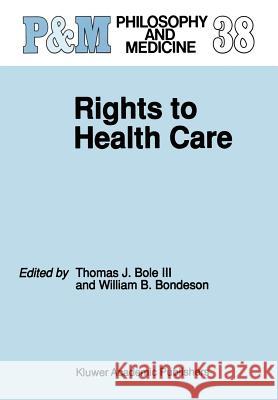Rights to Health Care » książka
Rights to Health Care
ISBN-13: 9780792311379 / Angielski / Twarda / 1991 / 382 str.
Human existence is marked by pain, limitation, disability, disease, suffering, and death. These facts of life and of death give ample grounds for characterizing much of the human condition as unfortunate. A core philosophical question is whether the circumstances are in addition unfair or unjust in the sense of justifying claims on the resources, time, and abilities of others. The temptation to use the languages of rights and of justice is und- standable. Faced with pain, disability, and death, it seems natural to complain that "someone should do something," "this is unfair," or "it just isn't fight that people should suffer this way." Yet it is one thing to complain about the unfairness of another's actions, and another thing to complain about the unfairness of biological or physical processes. If no one is to blame for one's illness, disability, or death, in what sense are one's unfortunate circumstances unfair or unjust? How can claims against others for aid and support arise if no one has caused the unfortunate state of affairs? To justify the languages of fights to health care or justice in health care requires showing why particular unfortunate circumstances are also unfair, in the sense of demanding the labors of others. It requires understanding as well the limits of property claims. After all, claims regarding justice in health care or about fights to health care limit the property fights of those whose resources will be used to provide care.











